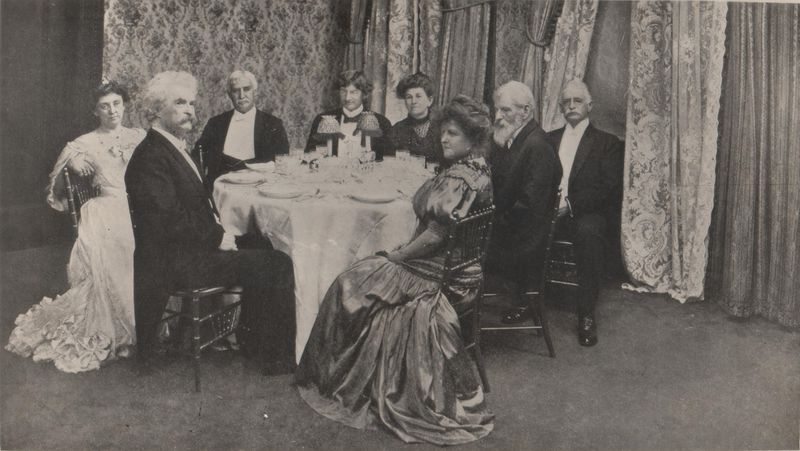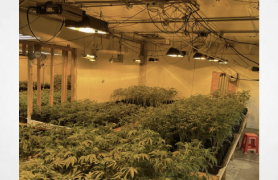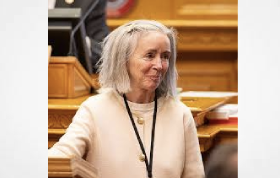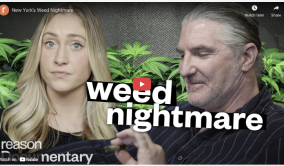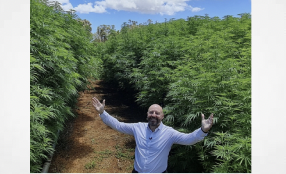If you wish to re-publish this story please do so with following accreditation
AUTHOR: Heather Allman
PUBLISHER: CANNABIS LAW REPORT
Insider Interview with Emily Flippen: Cannabis Market Analyst at The Motley Fool — She’s known as ‘The Flippenator’
The Georgia elections went for the Democrats, giving them control of the House, Senate, and Presidency. While this does not guarantee any sort of change in cannabis legislation, it makes the passage of important legislation — including CBD reform and banking legalization — that has been sitting idle in the Senate, much more likely to at least be voted on and potentially passed.
It also has wider impacts on the likelihood of federal cannabis legalization by 2022 and the possible future implications on the cannabis market of any federal legalization.
PERSONAL INTRODUCTION
Emily Flippen is a young cannabis professional who works for an investing advisory company called The Motley Fool. She went to school in Shanghai, China, where she was part of the inaugural class at NYU Shanghai. While in school, she quickly learned that ethics and finance don’t always go hand in hand.
In search of a career that would let her analyze equities without compromising her desire for transparency, she found an internship at the Motley Fool and has never looked back —and rightly so!
In January 2021, I had the unique pleasure of interviewing “The Flippenator,” Emily Flippen, a Cannabis Market Analyst at The Motley Fool to talk about how she first got into the cannabis industry, possible legalization implications, advice for newcomers to thrive, and her ideal choices for Mark Twain’s Dinner Party guests, if the opportunity ever presents itself.
Cannabis Law Report: How did you get started in cannabis?
Emily Flippen: Actually not by any traditional means, because there are no traditional ways to get started. I was hired on as an analyst with the Motley Fool and I focused on growth-style investment opportunities, and an opportunity came up as a fool to help run our cannabis based investing service.
As I did more research into some of the companies that would be a part of that service, I figured out the laws or tenants that I had used in my history of growth-style investing really applied to the cannabis industry as well.
So at that point, I jumped in head first and quickly figured out that a lot of things that did apply also didn’t apply. For the past few years I’ve been running the Marijuana Masters portfolio, at The Motley Fool, and learning more, and investing in cannabis.
CLR: I really love that pioneering spirit because if you don’t know how to do it, you seem to be the person that’s going to figure out how to do it.
Emily: Yes, definitely. I love learning new things and I think the cannabis industry is an amazing example of an industry that a lot of investors immediately write off because of the preconceived notions they may have about this viability assessment of a heist that went into legalization in Canada.
But in reality, there are some very real great businesses led by smart people that are investable in the cannabis space today, so I love breaking down the barriers that I think exist between retail investors, even in professional investors’ minds, when it comes to the industry.
CLR: That’s wonderful that you said that —because I think this is our opportunity here to build a whole new box. There’s no box for cannabis; we’re kind of making “the cannabis box” as we go.
What is the most interesting story that’s happened to you since you began working at the floor as a cannabis market analyst?
Emily: That’s a really, really good question. I think the volatility in the space is probably the most interesting aspect and we’re long term investors at The Motley Fool.
So we’re accustomed to telling people and talking to people through volatility, but we structured a lot of our portfolios to deal with what is a normal level of volatility that you’ll get from investing in the market.
I don’t think anybody was quite prepared for the volatility that exists in the cannabis industry. So we put together the Marijuana Masters portfolio. We used a structure that was really similar to what we use. to serve other industries and other styles of investing, and it really quickly figured out that average investors will need a lot more hand holding when it comes to cannabis.
As we look at these businesses —because these are businesses that move, 10,15, 20%— with little to no news. And a lot of people aren’t ready for that level of volatility in their investments, so for me, I think the most interesting and challenging parts of running in the cannabis industry has just been the volatility… and reminding people that when this happens, you can’t panic; you take deep breath and be prepared for that to happen to your portfolio because, well, the upsides and the downsides still occur.
CLR: Definitely. Even 2020, I mean nobody could have predicted the market and what has happened with it going up and down as much as it did after being considered an essential service.
I agree with your assessment of volatility. I think that it sounds like you are trying to prepare your clients and investors that have portfolios — like with that Marijuana Masters series — prepared for whatever the market does from here on out.
Emily: Definitely. I think the biggest value that not just any Portfolio Manager, but anybody who’s invested in the cannabis industry, can provide to those around them is a reminder and some hand holding when times get tough.
The biggest mistake that we see investors make —and this isn’t true for just Marijuana Masters, it’s true for investing as a whole— is people who get scared and fall out of good companies, just because times are hard.
There were a number of people who made the mistake of selling in March when they saw their portfolios fall by 20 or 30% overnight essentially.
The best value that I think I can provide in the cannabis industry besides my insight on cannabis companies is just when those times happen, being that person to talk to, to remind people to not panic, that things get better and the worst thing that they can do is sell when the market crashes.
CLR: I think that’s excellent advice, and it’s wonderful to hear an analyst saying that because you read so many stories about companies going up and down.
For example, the companies in Florida that stopped delivering in March right before this happened and then had no delivery services set up.
I think you’re right: that as an analyst, it’s not just about analyzing and picking. It’s truly about people-care, or customer service in a way. How does your past professional expertise and experience help you now with this type of leadership role?
Emily: Yes, that’s a really good question. I’m young. I’m 26 years old, so I have not been investing long-term, at least not actively for any sort of type of bear market.
In reality, I think my personal experience probably wouldn’t have inclined me to be the best resource, but the good thing about The Motley Fool is that I work alongside people who have been doing this for 20 to 30 years, or even longer, who have amazing track records and are amazing people to talk to whenever I get nervous.
I can recognize when I feel those feelings in myself, for instance, today: when we have three different IPOs of more than 60% of the first day of trading. That level of volatility.
I’ve never invested through it. Experiencing that for the first time, as do most of the members that we have in Marijuana Masters across the field.
Having those co-workers and resources be the people I work alongside me, with my teammates, on the services, to act as somebody to talk to, it makes me realize that if I’m having these thoughts and I’m experiencing this for the first time, good chances are, our members are as well.
That serves as a great reminder to me to reach out to other people and to remind them that you could be feeling these things today, but it doesn’t change anything long-term.
I can embrace your feelings, recognize them, but then learn to move on from them.
It’s challenging. I won’t say that I’ve perfected it. I have, hopefully, many more decades of experience ahead of me to help do that, and whenever I feel like I’m not that worthy of our members,
I know that somebody else I work with is worthy.
CLR: I really love that spirit too, because we all have to be willing to practice the art of asking and that is when we need help, when we need to learn something.
That’s great that you have such a wonderful team around you. What would be the upsides of your job, or what do you enjoy most about it?
Emily: It’s so great. I’m blessed to wake up every morning and do something I love every day. There isn’t a day that I wake up and I’m not excited, because before I worked at the school, I was working at GE doing project finance modeling, but I would wake up on the weekends and I’d research companies, which is what my passion was.
Obviously, my favorite part of my job is that I get to do something I love every day.
But I think the flip side of that is feeling like I’m having a tangible impact on the people whose lives I’m influencing by my recommendation.
At The Motley Fool, we’re not asset managers, not in my position. We run a portfolio, but the onus is on our members to follow our advice when we say buy this or sell this, to follow that advice. If members aren’t taking us up on that advice, it essentially makes the advice useless.
Ultimately, a big part of the job is not just finding the right advice to give to members, but encouraging them to take action.
It’s wonderful when I feel like I’m encouraging people to make good decisions with their finances, with their investments, and in their lives.
That, and working alongside and working with great people doing what I love.
Plus, I think having the opportunity to visually see the impact that I’m having on people’s lives is probably one of the most amazing things.
CLR: Agreed. I have multiple sclerosis, and I’ve come down from 25 minutes to six all because of cannabis, which is amazing.
I really think that it’s truly something amazing when an insider such as yourself is in touch with the people and patients involved, Emily, and not just the players. I think that makes a big difference.
Emily: Oh, that’s amazing to hear, and I love talking to people who have personal experiences with the cannabis industry as well because a lot of my job is also reminding people that when you’re investing in cannabis, you’re investing in an industry that’s related to people, ultimately.
I love it when I get to talk to somebody who understands that aspect of the industry.
CLR: We talked a little bit already about 2020 and what happened with a lot of the portfolios that were selling in March, because the market drops — but let’s talk a little bit about the Georgia elections and what that might mean for the cannabis sector.
What are your thoughts on that, as far as the challenges —and maybe the bonuses— that we’re gonna we’re gonna see possibly happen? I know we’re all simply speculating here.
Emily: To be completely honest with you, I did not expect to see the Georgia elections go the way they did, so it was a little bit of a surprise for me.
I think you saw a bit of an immediate market reaction, so the market is definitely expecting legislation to pass, both through the House and the Senate.
Besides the law, I would say over the next four years, I think it’s good to remember that cannabis regulation maybe will come sooner rather than later.
We got information out today, for instance, the Virginia Governor has plans to legalize cannabis in Virginia by 2023. That’s great, and it’s unexpected.
But at the same time, it’s understandable that the priority ends up being on COVID relief in the economy and in the millions of people whose lives have been impacted over the past year.
So everything I’m going to speculate here, I went with acknowledgments that obviously other legislation likely takes priority over reforming the cannabis industry.
That being said, I’m really excited about a few different things. The first one is probably what everybody expects will happen sooner rather than later, which is banking reform.
- We saw the safe Banking Act pass the House, and then not get to the floor of the Senate.
That Act would really allow the state legal cannabis businesses to access the banking sector with safe and reliable banking. That’s wonderful.
- It prevents these cash-based businesses from having the additional liability that comes with having to transact, namely in cash.
- It can also improve the software services that many businesses are able to provide and just makes the whole consumption process easier.
What I’m most excited about, however, is actually the potential for decriminalization.
I think all federal legalization is not people-oriented. I think it’s more likely that we see a big push towards decriminalization, which could have a huge impact on the tax code, people’s rights, and in particular, how US-based cannabis companies are taxed.
Right now, US cannabis companies —because they’re dealing with a substance that’s illegal under federal law— are taxed based on that revenue, which doesn’t allow them to deduct normal business expenses.
- The opportunity for decriminalization could potentially greatly reduce their tax liability, which could make these US-based companies a more accurate picture of their profitability, especially when compared to their Canadian peers.
CLR: That leads into the question about how do you envision international trade with regard to cannabis in the future. We’ve talked about Canada a few times, and that’s exactly what I’m thinking: pharmaceuticals. Remember when people started going to Canada when they couldn’t get their drugs at a good price?
I think we’re going to see that with cannabis as well. How do you envision international trade with import/export playing out?
Emily: Now, because regulations are different in the US, within Canada, and within Europe where they have a really robust medicinal market, there’s different regulations about where you can grow, how you can grow, and the quality for which you need to grow.
It makes it really challenging for there to be any legitimate international trade market today. So it would be interesting to see how it develops.
If I had to speculate about how it develops. I would expect to see trade barriers come down as regulations start to shake out, especially in places like the United States and South America, where we see grow operations consolidate and head to warmer climates.
One of the biggest challenges right now in Canada is that it’s cheapest to grow outside —at least most producers swear outside growth can be the cheapest— but they can only grow eight months out of the year, meaning that for at least one quarter every year, they’re trying to grow ahead of time.
This means predicting what product and what type of cannabis is going to be in demand before they’re actually selling, and that can be challenging.
It can lead producers to have an excess of inventory, but they don’t have to write revenue down if they predict incorrectly. So, obviously, growing in a climate that would have a year round growing season with these benefits will take much longer. Government regulations are slow to the punch.
CLR: Right. I think that’s a good way to look at it: that those trade barriers will come down, and we’ll be able to talk more about the cultivation and exporting to other areas, and even reciprocity in the medical cannabis programs.
With the Florida companies where I am a medical cannabis card holder, they’re limited to business only in their own state, and as you said, there’s only so many months that they can grow.
When it comes to what you’re looking forward to, concerning this new Democratic President and Democratic Congress, we have banking reform number one on your list and we have decriminalization at number two. What would be number three on your list of reforms?
Emily: That’s a really good question. I’m leaning heavily towards decriminalization, and thinking it would be a predictable environment that’s going to come from increased regulation.
I think there’s an assumption that a lack of regulation is good for markets and good for companies, and it’s actually the opposite.
As the government works out regulation, banking reform must be one of the priorities, but decriminalization must be another reform.
A lot of people use cannabis or CBD as a dietary supplement, and these sorts of things are going to create a level of predictability in the market that’s going to attract new investment dollars — not just from individuals or institutions, but from cannabis itself.
Right now there’s this kind of cloak of ambiguity which everyone is operating under and having expectations of serviceability will make it so that investment dollars can be better spent. So I think finding that happy medium between having predictable regulations that allow for competitive markets over the idea of overregulated, “handcuffed” businesses.
Have your standoff between the FDA and Congress when it comes to the Food, Drug and Cosmetic Act as it applies, essentially, because CBD is an active ingredient and a drug Epidiolex.
With pharma, businesses aren’t technically allowed to sell CBD as a dietary supplement, despite the fact that many have been, and the FDA has really only gone after businesses that make unsubstantiated medical claims.
However, the inability for the FDA to come out and say, “Hey, this is okay. Or this isn’t okay.” has meant that third party retailers aren’t really stocking CBD oil, for instance, because they’re afraid to expose themselves to its liability. Then, the FDA has said “we don’t plan on changing our stance on CBD until Congress has reformed the Food, Drug and Cosmetic Act.”
So if there’s some sort of regulatory change, as applied to that Act, it could really open up the CBD and cannabis space.
CLR: That’s an excellent way to put the whole perspective into a manageable picture.
You’re right, I mean, this is one plant we’re talking about. It’s the same plant, it doesn’t matter if it’s the CBD market, or the cannabis market. One has more compliance, more rules, and one is totally unregulated.
I think what you’re saying is that a big thing that could be improved upon is that communication between the FDA and Congress— so that we could possibly not continue to go in circles with cannabis.
Emily: Exactly. I think the FDA is looking towards Congress for leadership when it comes to regulating these substances and Congress hasn’t been providing.
There’s definitely an expectation, or at least a hope, that with this new Congress reconvened both in the House and the Senate, there will be sustainable regulatory policy as it applies to cannabis plants.
CLR: I love hearing an analyst say that! Again, it’s something that whether in the cannabis or the CBD industry, we need to have some type of regulatory body have some frameworks in place, including tax code, including banking, including even descheduling —like they just did with the UN vote. What would be your reaction to the UN vote to reschedule cannabis? How is that going to come into play?
With the way that you’re talking about a predictable environment, and we’re talking about how the FDA isn’t going to pass anything until the Congress passes something.
Do you think that is where maybe that UN vote will come into play, perhaps?
Emily: The impact that the UN vote can have is mainly on research and development, so it could play out in any part on the federal level for the countries that are a part of the UN, by opening up a lot of US funding for more research on cannabis.
When we saw the US ineffectively regulate cannabis up to this point, a lot of that ineffectiveness came down to the fact that we just simply didn’t have decades to collect the data, like the UN member countries did, to start facilitating research on cannabis.
Ultimately, though, the UN vote and more research could accelerate the legalization process in more countries.
CLR: Your answers have gone through a lot of your vision for the next few years. How do we get there from here? What do you think needs to happen next? Congress or FDA, who needs to step forward first?
Emily: I think we just need more predictable regulations. We could legalize cannabis company regulations on the individual state, local level, but how it’s going to impact their existing operation, what it means for their ability to stay in operation, and what it means for how much people can buy, when they can buy, and the quality of the growth.
All of those are the things that are vital to creating an investable cannabis industry right now. Not having any of those details, just having the philosophy idea of legalization, means that it’s really hard to invest in the cannabis space with any predictability about what the future could look like.
We saw the issue come about in Canada, for instance, when we legalized in Canada, which is wonderful, and we saw a ton of investment for cannabis companies.
But we also saw this really delayed licensing process, which limited the number of stores certain provinces could have, allowed an illicit market to thrive in Canada to this day. Then they prevented cannabis marketing, advertising, branding, even on the products themselves. In some provinces, preventing the sale of edibles.
When they got into the industry, no one knew that these regulations were going to be so tough.
Thinking about what my ideal vision looks like for the future industry would mean that the US learns from the mistakes of Canada and creates more robust regulatory policies that create a more predictable environment —before cannabis is legalized.
CLR: Agreed. I feel like the US needs to not necessarily be first, clearly, but we need to try to do it better.
We need to try to learn from those lessons in Canada, the licensing issues, as you said, the regulatory and compliance issues that people were not aware of when they first got into the space.
CLR: On that note, we’re going to close out with a few fun questions because people assume that those of us that work in cannabis don’t have actual lives.
I like to throw in the old school dinner party. If you had a dinner party and could invite five guests today, which five guests would you invite to have a good conversation?
Emily: The first one that comes to mind is actually Richard Nixon who was a US history professor, and a former president that was very involved in my childhood, trying to get him to enlighten me on how he thinks about how regulatory policies, especially as they apply to things like environment, can come about in the United States.
That provides not only some exciting conversation, but also some interesting conversation with an interesting person. Candidates would be interested to hear his thought process about if you were in charge, how you go about the process of finding regulations to best suit the cannabis industry, while also protecting things like social justice.
Another one that comes to mind is actually Jack Dorsey. He’s the CEO of square and Twitter, and he’s a little bit of a personality. But he’s a CEO that I have followed for quite some time. And I think we have a lot in common. I would have so much fun picking his brain a little bit about how he goes about managing.
CLR: I love that I actually love those two guests so far. You’re on a roll.
Emily: Another guest who immediately comes to mind is Ben Clover. He’s the CEO of Green Thumb Industries. I’m interested to have them as dinner guests because I would have the opportunity to interview them in a more formal setting than at their headquarters.
It was the first candidate that I talked to that didn’t make me feel like he was trying to sell me something. And in fact, he was visibly nervous.
When we were doing the interview. I got off subject a little bit and asked a couple of questions, and he did a wonderful job of answering them. But you could tell he was nervous, and also a really insightful guy.
I would love to get him in a more casual setting, like maybe I was cross examining him about his business. I would just talk to him about the cannabis industry because he got his start, in large part, because his family tree actually comes back to cannabis prohibition in the United States.
I believe it was his great grandfather, or somebody in the family who actually jumped on the opportunity for post-prohibition cannabis cultivator and production.
CLR: Those three together, I imagine — from a leadership point of view, would have an excellent conversation with you. A quite unique dinner party, but fun, and that’s the point of this.
Thank you for your time today.
Emily: It was my pleasure.









